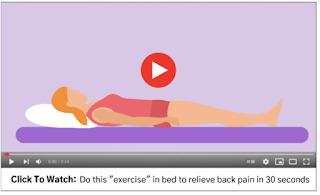Back pain is a common ailment that affects millions of people worldwide. It can be caused by a variety of factors, including poor posture, injuries, and underlying medical conditions. However, one lesser-known cause of back pain is stress. In this article, we will explore the link between stress and back pain and offer tips for managing both.
The Link Between Stress and Back Pain: Stress can cause physical tension in the body, which can lead to back pain. When you experience stress, your muscles tense up, including those in your back. This can cause pain and discomfort, especially if you are already prone to back issues. Stress can also cause inflammation, which can worsen existing back pain.
Types of Stress That Can Affect Back Pain: There are several types of stress that can affect back pain, including acute stress, chronic stress, and emotional stress. Acute stress is a short-term stress response, such as when you are faced with a sudden danger. Chronic stress, on the other hand, is long-term stress that can be caused by ongoing issues such as work or financial problems. Emotional stress, such as anxiety or depression, can also contribute to back pain.
Tips for Managing Stress and Back Pain: There are several things that can be done to manage both stress and back pain. Here are a few tips:
Practice Relaxation Techniques: Relaxation techniques such as deep breathing, meditation, and yoga can help reduce stress and alleviate back pain.
Get Regular Exercise: Regular exercise can help reduce stress and strengthen the muscles in the back, which can help alleviate pain.
Maintain Good Posture: Poor posture can contribute to back pain, so it is important to maintain good posture when sitting or standing.
Get Enough Sleep: Adequate sleep is essential for managing stress and reducing inflammation, which can worsen back pain.
Seek Professional Help: If stress and back pain are impacting your quality of life, it may be beneficial to seek professional help. A healthcare provider can offer advice on managing both conditions.
In conclusion, stress can be a contributing factor to back pain. By understanding the link between stress and back pain, individuals can take steps to manage both conditions. Practicing relaxation techniques, getting regular exercise, maintaining good posture, getting enough sleep, and seeking professional help can all help alleviate stress and back pain. By making these lifestyle changes, individuals can improve their overall health and quality of life.
The Link Between Stress and Back Pain: Stress can cause physical tension in the body, which can lead to back pain. When you experience stress, your muscles tense up, including those in your back. This can cause pain and discomfort, especially if you are already prone to back issues. Stress can also cause inflammation, which can worsen existing back pain.
Types of Stress That Can Affect Back Pain: There are several types of stress that can affect back pain, including acute stress, chronic stress, and emotional stress. Acute stress is a short-term stress response, such as when you are faced with a sudden danger. Chronic stress, on the other hand, is long-term stress that can be caused by ongoing issues such as work or financial problems. Emotional stress, such as anxiety or depression, can also contribute to back pain.
Tips for Managing Stress and Back Pain: There are several things that can be done to manage both stress and back pain. Here are a few tips:
Practice Relaxation Techniques: Relaxation techniques such as deep breathing, meditation, and yoga can help reduce stress and alleviate back pain.
Get Regular Exercise: Regular exercise can help reduce stress and strengthen the muscles in the back, which can help alleviate pain.
Maintain Good Posture: Poor posture can contribute to back pain, so it is important to maintain good posture when sitting or standing.
Get Enough Sleep: Adequate sleep is essential for managing stress and reducing inflammation, which can worsen back pain.
Seek Professional Help: If stress and back pain are impacting your quality of life, it may be beneficial to seek professional help. A healthcare provider can offer advice on managing both conditions.
In conclusion, stress can be a contributing factor to back pain. By understanding the link between stress and back pain, individuals can take steps to manage both conditions. Practicing relaxation techniques, getting regular exercise, maintaining good posture, getting enough sleep, and seeking professional help can all help alleviate stress and back pain. By making these lifestyle changes, individuals can improve their overall health and quality of life.

Commenti
Posta un commento